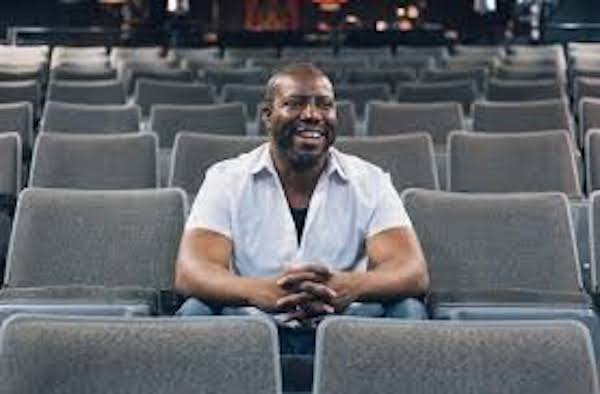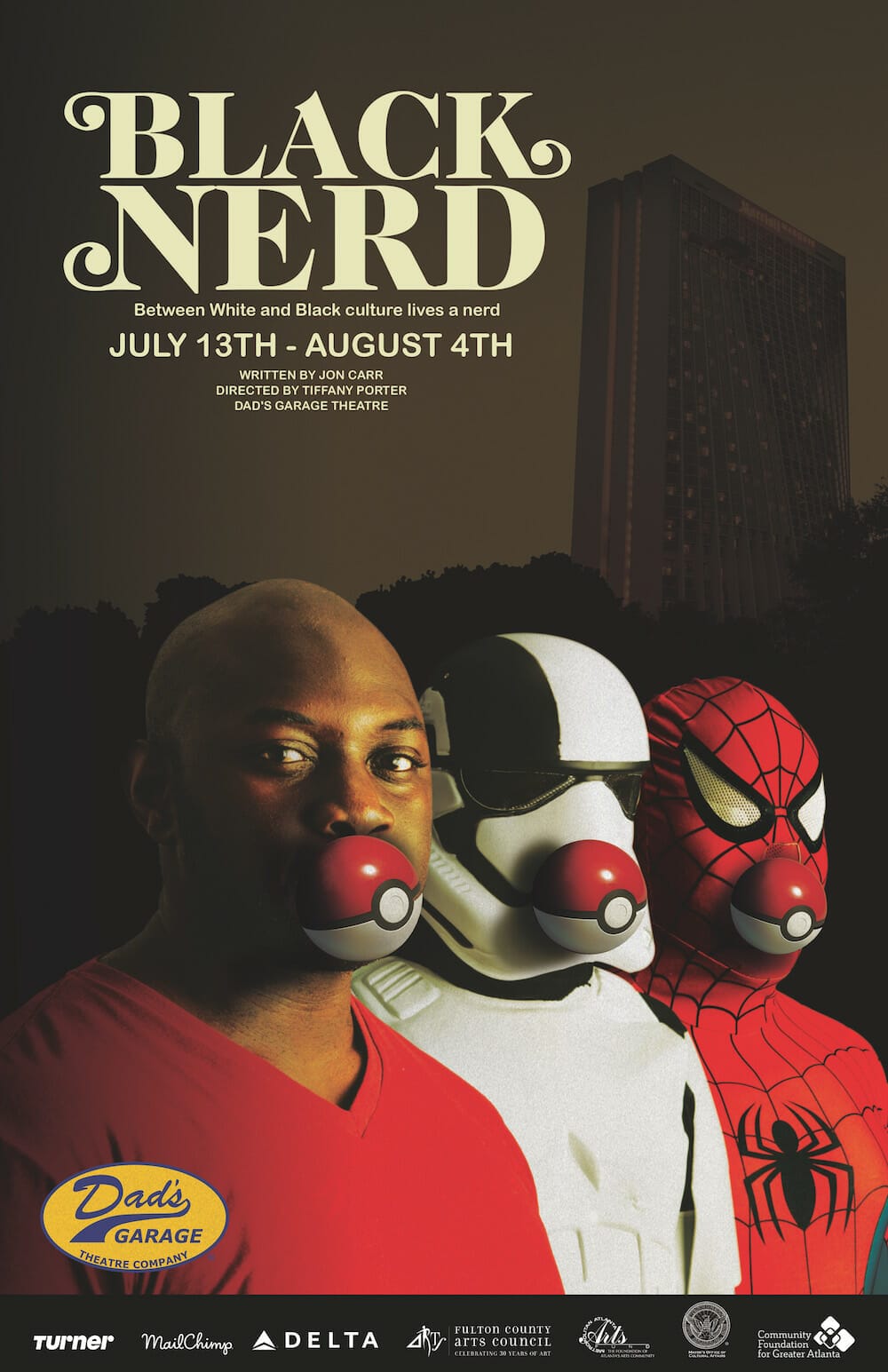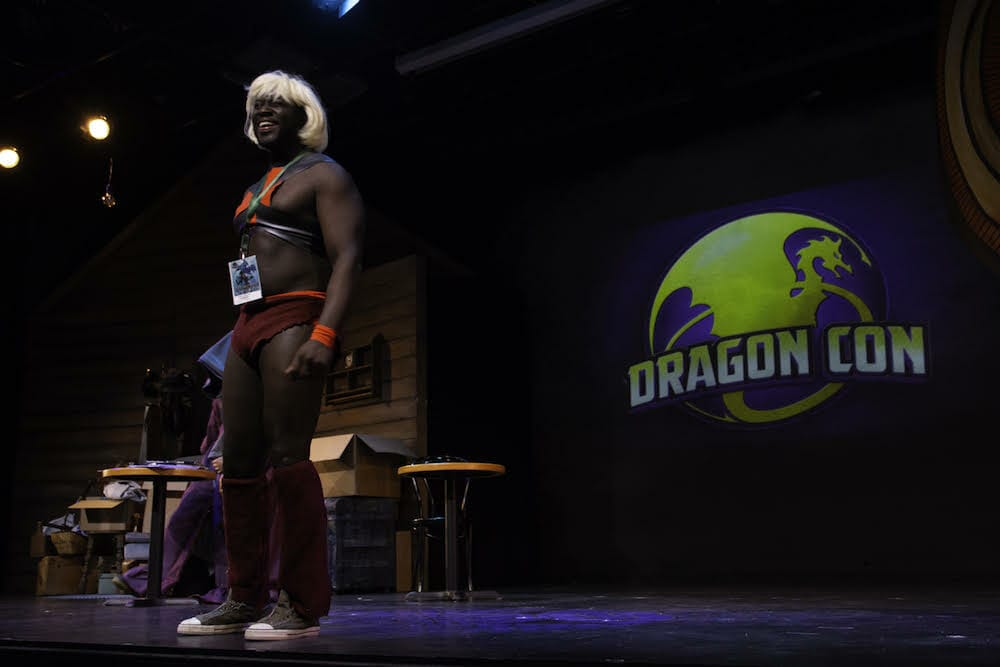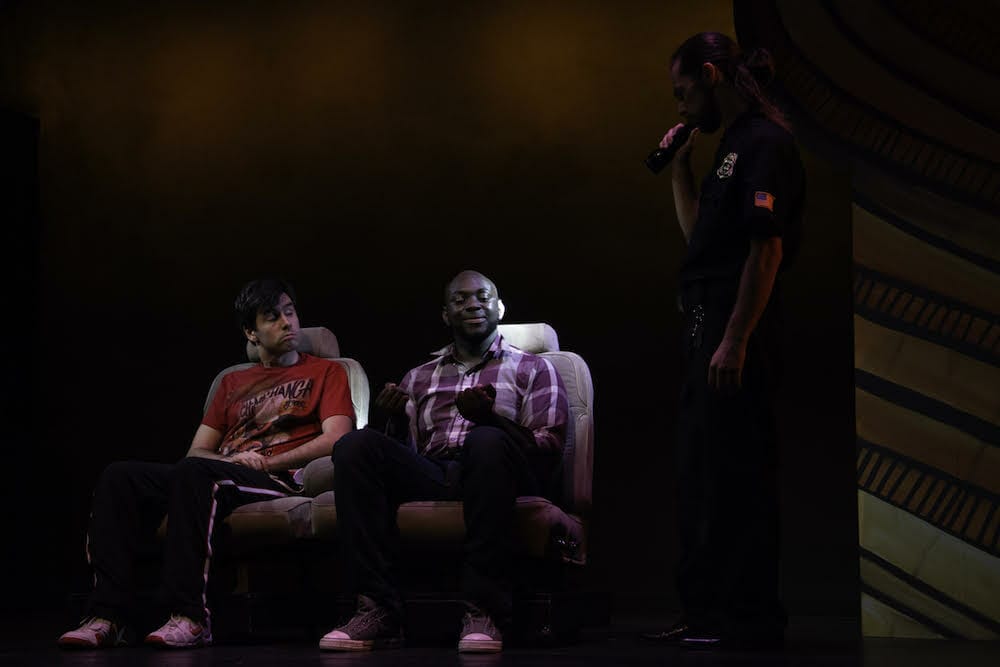Editor’s Note: Read related interviews in the George Floyd: In Memoriam roundup.
Southern California actor Jon Carr (JC) shared his thoughts on the Black Lives Matter movement with Picture This Post (PTP). The comedian and self-proclaimed nerd is the newest artistic director of Dad’s Garage Theatre in Atlanta. In 2018, he wrote about his experience as a Black nerd in his play aptly titled Black Nerd.
(PTP) Please tell our readers a little bit about your personal and performance background.
(JC) I have always been performing. Even as a kid, I used to help my parents in the performances they did for churches. I was homeschooled by traveling Christian clowns and grew up in Southern California. I did not have the traditional public school experience. Instead, I was homeschooled and surrounded by other squeaky clean kids of all races, but let’s be clear, I was a big weirdo. I grew up loving comics, musicals and classic films from the ‘50s—I had a brief Gene Kelly phase—which was not the norm for most of the kids growing up in Inglewood, California in the ‘90s. I was a nerd.
As the writer and creator of Black Nerd I wanted to give my perspective on The Black Experience. I rarely saw myself onstage, and I wanted to change that. There is no one monolithic Black Experience, yet when you look at movies, music, and TV shows, it feels like there is. While I appreciate and enjoy these aspects of entertainment, that wasn’t my experience.
For me, The Black Experience is not a singular life path but a way of engaging and interacting with the world that we as Black Americans all live with. Case in point: Getting pulled over. Even though I grew up in a very tame, Christian, code-switching household, my father took an extra day in teaching me to drive in order to show me how to get pulled over. Teaching kids about the realities of getting pulled over, going to a White friend's home or just walking around is something many young Black people learn from their parents, no matter how they grew up. Understanding the impact of systemic racism and how it can harm me as a Black person, even if I’m an upstanding, law-abiding citizen, is the truth of the Black Experience and is something that can transcend class, region of our country or any other category.
How did you get connected with Dad’s Garage?
Dad’s Garage is the premiere improv and scripted comedy theatre in the Southeast. We have been in existence for 25 years. We have a younger audience base than most theatres, drawing in 20- to 35-year olds who may not normally consider themselves theatregoers.
I moved to Atlanta in the early 2000s and had a real hard time meeting friends. I started taking classes at Dad’s in order to try something new and make some connections. Now, 15 years later, I still have some of the same friendships I made in that first improv class and a wonderful artistic family.
I became the sixth artistic director in Dad’s Garage history on February 1, after many prior roles with the company and also being part of the performing ensemble since 2014.
How has your family been impacted by your work and these times?
My parents and brother live in Atlanta, and they’ve all gotten to see a number of my projects. I don’t know that my work or these times have impacted them in a traditional sense. The murder of George Floyd was incredibly painful, but he was not the first. I do feel like my life is in danger, but I’m in the same amount of danger I was in last year. The only difference is we are talking about it. So for me and my family, these times were simply a reminder of something we never forgot.
It allowed me to come up with fascinating and entertaining tales, but I was also convinced that no one wanted to hear about my weird life. It wasn’t until I started opening up and talking about my experiences and actually had people connect with them that I was able to feel more comfortable. As I move forward I just want to become even more honest in my work.
I don’t know that I write with a focus on Black Lives Matter or anti-racism. I’m just Black, and racism is a part of my story. I don’t know that there is a way to be transparent and not have that be part of the story.
How have you translated your own personal experiences of racism into your own work?
When I wrote the play Black Nerd, which we produced at Dad's Garage in 2018, I was describing my personal experience as a Black man who enjoys nerdy things like Star Wars, anime, and hyper-specific theatre references. But this play also gave me the chance to visit some darker moments from my past and process those pains into a script and show that can help others understand issues like racism and police violence.
Most of the play Black Nerd was filled with jokes. There were jokes about my dorkiness as a child and how I loved old Hollywood musicals. There were jokes about going to sci-fi conventions and the Renaissance festival. However, the tone of the show shifted very quickly in one scene where the main character was pulled over by a police officer. In this moment the audience would go silent—quite a change from all the laughter that had previously filled the room. These moments allow me to interject my real life experiences.
From your perspective, what is the role of humor in dismantling racism?
At Dad’s Garage, we believe humor can be used to change perspectives on important issues. If I can make you laugh then you are more likely to want to spend more time with me, open up to me and listen to me. This principle is the only reason I get laid. By framing something in a comedic context, audiences let down their guards and are more likely to empathize with something important, like understanding systemic racism. It isn’t necessarily about making jokes about being pulled over by the police but instead working these hard moments into a larger comedic show. Humor can be used to say something serious is something I truly believe, and it’s what we try to do at Dad’s Garage.
In his influential 1969 essay The Revolutionary Theatre, the writer and critic Amiri Baraka said, “Our theatre will show victims so that their brothers in the audience will be better able to understand that they are the brothers of victims, and that they themselves are victims, if they are blood brothers.” No White person could fully understand what it is like to be Black in America, but by showing these lived experiences of racism, Black playwrights help build empathy with audiences. If we want to dismantle systemic racism in our nation, we need to show it, name it and let audiences see its ugly face.
My desire is that my fellow Black and Brown theatre makers will be given the space to translate their own experiences into works that will move audiences and that theatre consumers will seek out works by and about black and brown perspectives. This is how we can build empathy and create lasting change in our community.
How do you reach a racially diverse audience through your work?
People feel comfortable at the theatre where they see themselves on stage. By diversifying our cast, crews and students, we start to see the audience change to reflect that. Dad’s Garage has a number of scholarship programs focused on increasing diversity in our improv community.
We believe that by diversifying our performer groups, we can draw in a more diverse audience. The diversity and inclusivity scholarship is just one way we do this. This scholarship pays for 100% of the costs of our improv classes and supports people’s growth as performers. We have funded dozens of scholarship recipients, many of whom have gone on to join our roster of improv performers, been cast in scripted and improv shows, and become part of the Dad’s Garage family. Because we recruit our performers from our classes system, this will continue to ensure growth in our cast diversity.
How do you think complaints by other comedians about comedy being hampered with concerns for political correctness impacts the ability to use humor to attack racism?
When I hear improvisers complain about not being able to “make that joke,” usually it is because they have never had to stand onstage with an improviser of a different race and “make that joke” to their face. We’ve talked about this frequently at Dad’s Garage. Another way of saying politically correct is to only make the jokes you are willing to make when you are standing face to face with me.
So yes, you do lose the ability to make some jokes but by diversifying you gain ten times the number you lost. As a Black writer, I am able to tackle racism through a comedic lens. I can make outrageous jokes because it actually happened to me, and real life is crazier than anything I could come up with on my own. Throw in the fact that we have such a diverse cast if anyone is unsure if something is offensive or could hurt someone, there is someone to ask, and they won’t just say no to an idea. They will “Yes, and” it and help you create something better than you would have on your own.
If you weren’t a performer, what other type of career would you like to have had?
I would like to be a professional wrestler, but I hate stretching, weightlifting and strenuous physical activity, so it was not meant to be. For now, I am just an appreciator of wrestling as one of the most awesome artforms.
For more information on Carr and Dad's Garage, please visit the Dad’s Garage website
Nominate this for The Picture This Post BEST OF 2020???
Click Readers' Choice
Vote Securely! Vote Privately! And Make Your Vote Count-- as all voting should be!!
Nominate this for The Picture This Post BEST OF 2020???
Click Readers' Choice
Vote Securely! Vote Privately! And Make Your Vote Count-- as all voting should be!!
Images courtesy of Dad’s Garage






